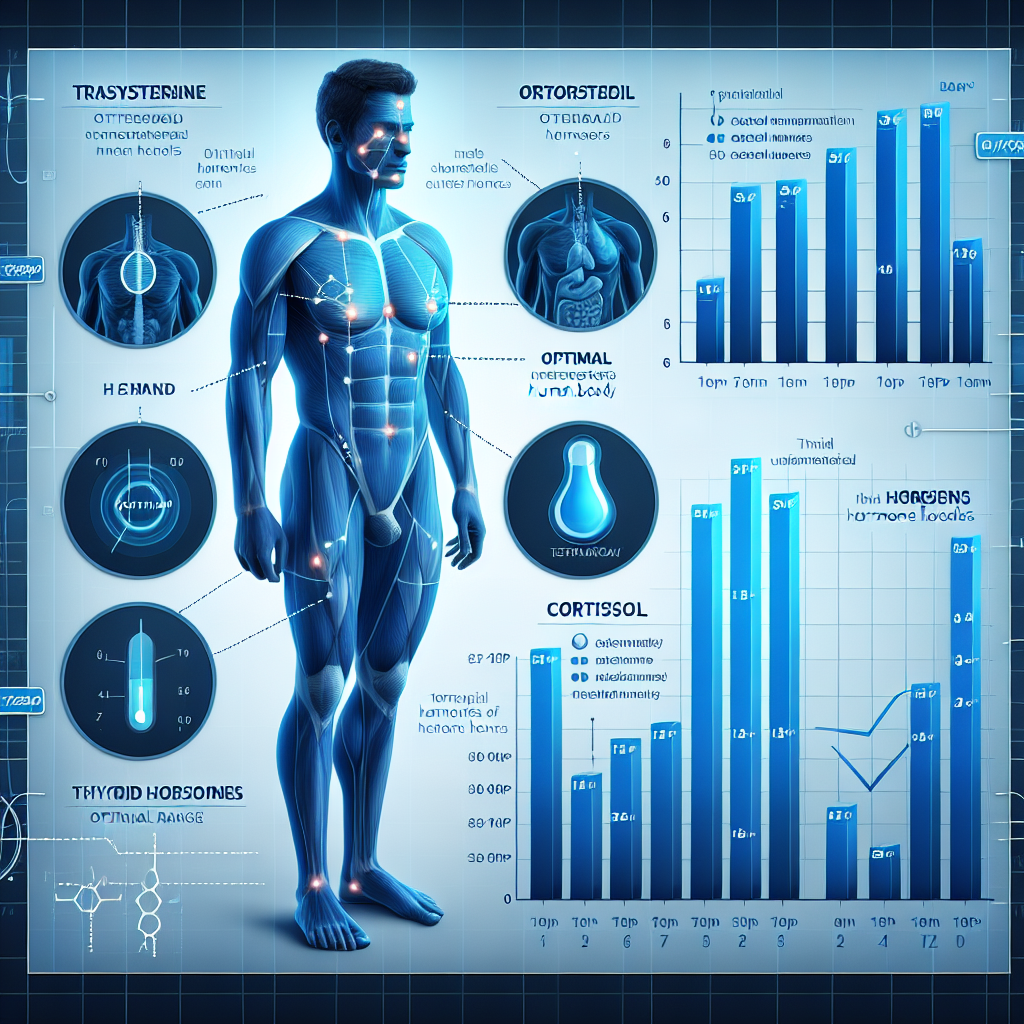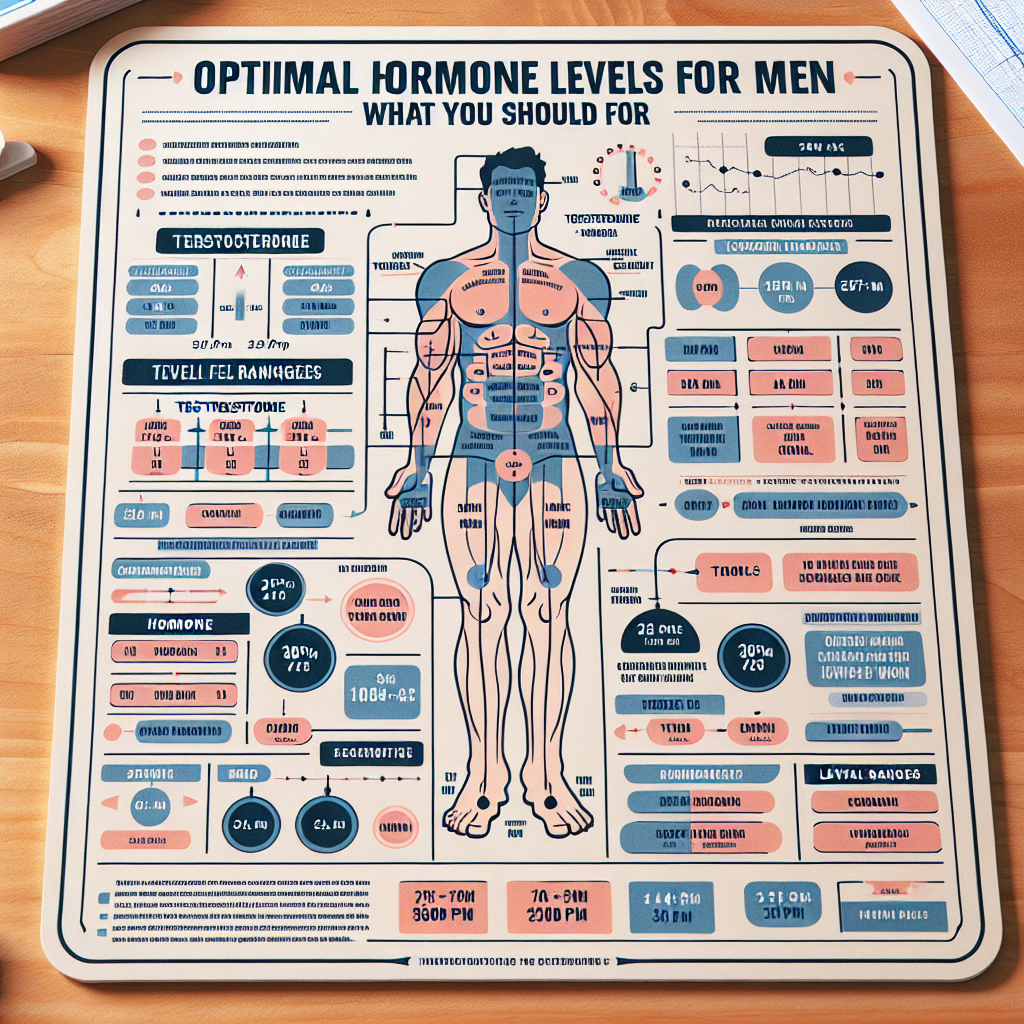Optimal Hormone Levels for Men: What You Should Know

Discover the importance of optimal hormone levels for men and what you should know. Empower your health today by visiting My Vibrant Vitality for more information.
Understanding the Importance of Optimal Hormone Levels in Men
Hormones are the body’s chemical messengers, playing a pivotal role in regulating nearly every physiological process. They are responsible for controlling a wide range of bodily functions, including metabolism, immune response, and mood. For men, maintaining optimal hormone levels is crucial for overall health and well-being. This article aims to shed light on the importance of optimal hormone levels in men and what you should know about it.
Testosterone, the primary male sex hormone, is perhaps the most well-known and significant hormone in men. It is responsible for the development of male reproductive tissues and the promotion of secondary sexual characteristics such as increased muscle and bone mass. Testosterone also plays a crucial role in maintaining sexual function, mood, and quality of life. However, testosterone levels naturally decline with age, leading to a condition known as hypogonadism or low testosterone. Symptoms of low testosterone can include fatigue, depression, decreased libido, and cognitive difficulties.
On the other hand, excessively high levels of testosterone can also pose health risks, including an increased likelihood of heart disease and certain types of cancer. Therefore, maintaining optimal testosterone levels is a delicate balancing act that requires careful monitoring and, in some cases, medical intervention.
Another hormone that plays a vital role in men’s health is cortisol, often referred to as the “stress hormone.” Cortisol helps regulate the body’s response to stress, but chronic high levels can lead to a host of health problems, including weight gain, high blood pressure, and a weakened immune system. It can also interfere with testosterone production, leading to further health complications.
Insulin, a hormone that regulates blood sugar levels, is another critical hormone for men. Insulin resistance, a condition in which the body does not respond properly to insulin, can lead to type 2 diabetes and is often associated with other serious health conditions, including heart disease and stroke.
The thyroid hormones, including thyroxine (T4) and triiodothyronine (T3), are also essential for men’s health. These hormones regulate the body’s metabolism, affecting how the body uses energy and processes food. An underactive thyroid (hypothyroidism) can lead to symptoms such as fatigue, weight gain, and depression, while an overactive thyroid (hyperthyroidism) can cause symptoms such as rapid heart rate, weight loss, and anxiety.
In conclusion, maintaining optimal hormone levels is crucial for men’s health. Hormonal imbalances can lead to a wide range of health problems, from mood disorders to chronic diseases. Therefore, it is essential for men to be aware of the importance of hormonal balance and to seek medical advice if they suspect a hormonal imbalance. Regular check-ups, a balanced diet, regular exercise, and stress management techniques can all contribute to maintaining optimal hormone levels. However, in some cases, medical intervention may be necessary to correct hormonal imbalances. Always consult with a healthcare professional for personalized advice regarding hormone health.
How to Maintain Optimal Hormone Levels for Men: A Comprehensive Guide

Hormones play a crucial role in the overall health and well-being of men. They are responsible for regulating various bodily functions, including metabolism, growth and development, sexual function, and mood. However, maintaining optimal hormone levels is not always straightforward. It requires a comprehensive understanding of the role of hormones in the body, the factors that can affect their levels, and the steps that can be taken to ensure they remain balanced.
Testosterone, the primary male sex hormone, is of particular importance. It is responsible for the development of male sexual characteristics and plays a key role in maintaining muscle mass, bone density, and red blood cell production. However, testosterone levels naturally decline with age, leading to a range of symptoms such as fatigue, depression, decreased libido, and cognitive difficulties.
To maintain optimal testosterone levels, it is essential to lead a healthy lifestyle. Regular exercise, particularly resistance and high-intensity interval training, can stimulate testosterone production. A balanced diet rich in lean proteins, healthy fats, and complex carbohydrates can also support hormone production. Additionally, adequate sleep is crucial as most testosterone production occurs during sleep.
Stress management is another critical aspect of maintaining optimal hormone levels. Chronic stress can lead to hormonal imbalances as it triggers the release of cortisol, the body’s primary stress hormone. High levels of cortisol can suppress the production of testosterone. Therefore, incorporating stress management techniques such as meditation, deep breathing exercises, and yoga into your daily routine can help maintain balanced hormone levels.
Alcohol and certain medications can also affect hormone levels. Excessive alcohol can decrease testosterone levels and increase the production of estrogen, the primary female sex hormone. Certain medications, such as opioids, steroids, and some antidepressants, can also lower testosterone levels. Therefore, it is advisable to limit alcohol consumption and discuss any potential side effects of medications with your healthcare provider.
Regular health check-ups are also essential for maintaining optimal hormone levels. These check-ups can help detect any hormonal imbalances early and allow for timely intervention. It is particularly important for men over the age of 40 to have their testosterone levels checked regularly as part of their routine health assessments.
Supplementation can also be beneficial in maintaining optimal hormone levels. For instance, vitamin D is a steroid hormone that can boost testosterone levels. However, many people are deficient in this essential nutrient. Therefore, vitamin D supplementation can be beneficial. Other beneficial supplements include zinc, which is essential for testosterone production, and magnesium, which can improve the quality of sleep and thus support testosterone production.
In conclusion, maintaining optimal hormone levels in men requires a multifaceted approach that includes a healthy lifestyle, stress management, regular health check-ups, and potentially supplementation. It is important to remember that while these strategies can support hormone health, they are not a substitute for professional medical advice. If you suspect you have a hormonal imbalance, it is crucial to consult with a healthcare provider who can provide a comprehensive evaluation and guide you in making the necessary lifestyle modifications or medical interventions.
The Impact of Optimal Hormone Levels on Men’s Health and Well-being
Hormones play a pivotal role in the overall health and well-being of men. They are the body’s chemical messengers, influencing a wide range of physiological processes, from metabolism to mood regulation. Optimal hormone levels are crucial for maintaining physical health, mental well-being, and quality of life. This article aims to shed light on the importance of maintaining optimal hormone levels and the impact they have on men’s health and well-being.
Testosterone, the primary male sex hormone, is a key player in men’s health. It is responsible for the development of male reproductive tissues, the promotion of secondary sexual characteristics, and the maintenance of muscle mass and bone density. Optimal testosterone levels are associated with improved mood, increased energy, and enhanced cognitive function. Conversely, low testosterone levels can lead to a host of health issues, including fatigue, depression, decreased libido, and osteoporosis.
However, testosterone is not the only hormone that matters. Cortisol, the body’s primary stress hormone, also plays a significant role in men’s health. Produced in the adrenal glands, cortisol helps regulate the body’s response to stress. It also plays a crucial role in various bodily functions, including metabolism and immune response. High cortisol levels, often a result of chronic stress, can lead to weight gain, high blood pressure, and impaired cognitive function. Therefore, maintaining optimal cortisol levels is essential for overall health and well-being.
Insulin, a hormone produced by the pancreas, is another critical hormone for men’s health. It regulates the body’s blood sugar levels, ensuring they stay within a healthy range. Insulin resistance, a condition where the body’s cells become less responsive to insulin, can lead to type 2 diabetes, a condition that affects millions of men worldwide. Maintaining optimal insulin levels can help prevent insulin resistance and its associated health risks.
Thyroid hormones, produced by the thyroid gland, are also vital for men’s health. They regulate the body’s metabolism, affecting everything from body weight to energy levels. Hypothyroidism, a condition characterized by low thyroid hormone levels, can lead to weight gain, fatigue, and depression. On the other hand, hyperthyroidism, characterized by high thyroid hormone levels, can cause weight loss, rapid heart rate, and anxiety. Therefore, maintaining optimal thyroid hormone levels is crucial for overall health and well-being.
In conclusion, hormones play a crucial role in men’s health and well-being. Optimal levels of testosterone, cortisol, insulin, and thyroid hormones are essential for maintaining physical health, mental well-being, and quality of life. Regular check-ups and a healthy lifestyle can help maintain these hormone levels within the optimal range. It’s important to remember that any significant changes in mood, energy levels, or physical health could be a sign of hormonal imbalance. If you suspect you may have a hormonal imbalance, it’s essential to seek medical advice. With the right treatment and lifestyle changes, it’s possible to restore hormonal balance and improve overall health and well-being.